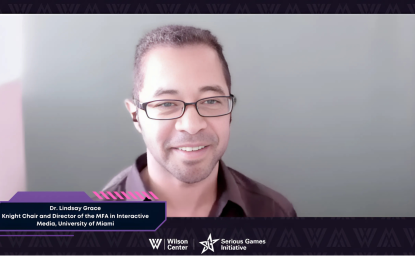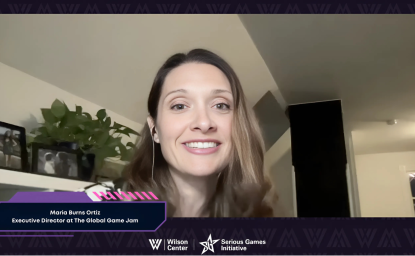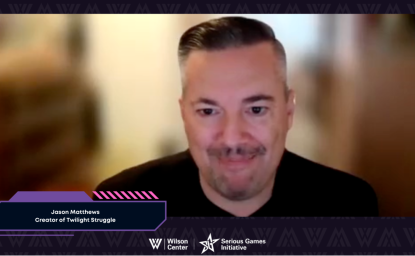Elizabeth Newbury:
Welcome back to another video from the Serious Games Initiative at the Wilson Center. As you may know already, we are celebrating our 20th year anniversary, and part of that is that we've been in this field for so long. We're developing and researching games, but also Amplifying Voices from the broader field of serious games. Throughout the decades, our approach is mostly focused on amplifying both science and science policy and then public policy through the medium of games. Some of our titles include the illustrious Budget Hero and The Fiscal Ship games, which focus on the US, federal budget and decreasing our national debt. And then also, some of our games that we've released recently are about plastic pollution in our oceans, called the Plastic Pipeline. And then another game series that we were working on is a series of artificial intelligence games everyone's favorite hot topic, and we have games on everything from neural networks to bias in AI systems and many more to come. As part of our 20th anniversary, one of the things we wanted to do is make sure that we were amplifying voices from the field of serious games, both from industry and academia, but also from the federal government. But this is part of our overall interest in how serious games are being used, both how they have been historically used, how they are currently being interrogated in the field, and then maybe what the future holds. So the past, present and future of serious games. I'm joined here today by Dan. And Dan, would you mind first introducing yourself and how you orient towards the field of serious games?
Dan Baden:
Sure. First of all, thank you very much for the invitation. So my name is Dan Baden. I'm a family physician. I've been at CDC for 22 years. I've been a game designer since I was a kid, I've got a couple published games outside of work. I've been involved in serious games since 2009 at CDC, as well as across federal government. I joined the Federal Games Guild, I believe, in 2011. I led two game jams at CDC in 2013 and 2014 and we've researched the impact of one of the games developed in a game jam on knowledge retention and behavioral change intent. So I'm passionate about games and series games.
Elizabeth Newbury:
That's amazing and such a like a long history of engaging if you've been designing them since you were a kid. So just thinking back over the past couple of decades, when we started to nickel on the word serious games, can you describe some of the catalyst or the spark of interest in serious games, particularly based on your experience with the CDC?
Dan Baden:
Sure. I think some of the interest started back early 80s, when people started realizing that games were bigger than Hollywood, and it's just exploded since then. I read an article recently that said the game industry was bigger than all movies worldwide, as well as all professional sports in North America. So it's a enormous feel. I started seeing some of the interest back in 2003 when I was involved in a lot of CDC emergency response activities, and CDC got together with FEMA and the Department of Defense and State and local health departments across the country to develop trainings for first responders, which includes public health professionals. So starting to see that synergy between groups like the DOD, who have done tabletop exercises for decades, with public health professionals who this was a new concept for and then in 2011 when President Obama launched the Games for Grand Challenges initiative that gave a lot of respectability to games which had a bias against them, and that led to health and human services offering funding for innovative approaches, for which we actually won 50,000 in 2013 to hold our first game jam. And I think we got 100,000 in 2014 for a second game jam. So those were some key things that I saw. But once we were able to do the game jams, once we're able to have the Secretary of Health and Human Services sign off on the use of serious games, it opened doors within CDC, and I was able to capitalize on that to get other groups who initially we wouldn't even dreamed of it, to get engaged in serious games.
Elizabeth Newbury:
Can you walk us back a little bit? Why a game jam?
Dan Baden:
Oh, that's good question. We had been trying to find ways to get people get leadership open to the idea of games. And there were three of us, Lee Willis, Peter Jenkins and I got together and brainstormed when we saw this initiative come out from the department, and applied and a game jam was the idea we came up with. We talked with local partners. We talked with Ben Sawyer at the games for health when he was with them. We talked with people at some of the local universities as well as the Georgia Game Developers Association. So we built a network here in Atlanta, and our response was, we were able to get 300 student and professional game designers together for a typical game jam. For the eight hours, we made 29 prototypes of games across the health sector. And this all happened the same weekend that Grand Theft Auto Five came out, so they came to the Game Jam instead of playing Grand Theft Auto. That’s great big deal, and we'd love looked at, we evaluated, we CDC, we love data. We evaluated the game jam. We're able to demonstrate that we had a dramatic increase n interest in Public Health Careers just by hosting a game jam, because nobody thought of public health career prior to the game jam. After the game jam, we had a significant number of people who were at least open to the idea. Then in 2014 we had a similar level of response. We expanded it so that we had NIH and HRSA also participate with our subject matter experts. So we had 25 to 30 subject matter experts, along with 300 and for the second game jam, we got 41 prototypes developed over the weekend. We then supported one of those all the way through completion, and then did a randomized controlled study on it to see whether or not there was impact both on knowledge retention and behavioral change intent. These were 41 HIV related games, and we were able to demonstrate significant improvement compared to a control group.
Elizabeth Newbury:
If there's any resources that we can link below for folks who are interested in the game that you supported through or some of this research, we'll happy to link it down after this interview, but it sounds like there was a mix of both galvanizing of the community of game developers to help support a cause for good, HIV outreach and engagement, And then there's also the secondary effect of really motivating those who participated in the game jam to continue to be more involved in health based research or outreach in education. Is that an accurate read?
Dan Baden:
I think that's accurate both with the local community as well as within CDC and HRSA and NIH, just getting people open to the idea, NIH has been able to do get a lot more funding for games than CDC has, but we've been able to do some things internally. We've got our solve the outbreak app where people pretend like they're disease detectives. We have virtual coal mine where miners and first responders can go in and experience emergencies, whether it's fire, flooding, cave in, those types of things, so they understand ahead of time what how to deal with those emergencies. We developed a virtual world for post hurricane so that our responders were able to go and experience some of the challenges to avoid having PTSD when the responders return. So we've done various different things. I know a group that even put together a game to demonstrate the efficacy of vaccinating dogs against rabies rather than treating people who had been bitten. So there's many different out there, ideas that people typically would not think of where we can use games to move things forward.
Elizabeth Newbury:
And it sounds like it's a mix of these training exercises and outreach. So one of the reasons maybe using for a virtual reality set for hurricanes, coal mines, fires, etc, is it's a lot safer to train them in a virtual reality session, right?
Dan Baden:
Definitely, and we've got one for laboratorians. And it's a lot cheaper to mess up a laboratory experiment in a virtual world than it is with real expensive reagents, as well as the danger.
Elizabeth Newbury:
So this kind of leads me to my second question, which is, you have this long history of engaging with games and game based approaches. How far do you think the serious games field has come, particularly maybe in the health sector?
Dan Baden:
I think it's made progress. I still think there's a long way to go. Initially, there was significant bias against games. I think there still is bias against games, and so sometimes you call them exercise or simulations or different things like that. But really it's using the mechanics of games and game theory and those types of things for a bigger purpose, rather than just entertainment.
I think we've made progress internally, inside government, I think we've made progress linking with our communities like I had mentioned before, game jams. I still think there's quite a bit of work to do, though. I think having additional money, like NIH is really good at putting out money. CDC doesn't have that opportunity. But if we can educate people internally on this, they can be more open to the idea. So we're gradually doing that as games become even more pervasive across the world. I mean, whether people are playing Wordle or words for friends or some of those things or on their devices, they're engaged in this type of experience, they're starting to become more and more comfortable with it. So it's not a far stretch to get to some of the games like you mentioned earlier about the federal budget and some of these types of things where people are able to try things themselves and learn potential outcomes.
Elizabeth Newbury:
Yeah, I think that's a really interesting thread right where it's, we've, we still have, we started with a lot of bias, and so a lot of the research and engagement has focused largely on evidence that games can have a positive impact. We're still, still negotiating that a little bit on how, what types of impact we can expect from games, but still from the government perspective, government academia, we're all a little slow to embrace change, as it were, so just sort of navigating those and what types of impact we would want to have with games.
Dan Baden:
I think we've come a long way, though. I remember I was playing lunar lander on terminal linked to a mainframe at a local university back in 76, learning about physics and thrust and all those types of things, just by typing in numbers and getting numbers back. It's come so far in that respect, but there's still a ways to go.
Elizabeth Newbury:
What would you hope is the future for serious games? What is, what's the next big thing to sort of impact the field?
Dan Baden:
Well, I'm sure many people will say something along this line, but AI, I mean, there's so many games out there right now where, if you're playing a computer game and playing against non-human players, for the computer has to cheat to make it competitive. I mean, that's builtin whether they get double production, double gold or who knows what, it cheats. I think we are right on the verge of computers starting to learn they're so much better at looking at patterns and different things like that, or tracing routes, if Ticket to Ride or something like that is your game, uh, computers will likely just get better and better and better, and we can turn it around where AI is not learning from us, but we're learning from AI things that we may not have thought of. So I don't know if that's true creativity, but it's learning to see patterns that humans are not good at seeing and benefiting from AI in that respect.
Elizabeth Newbury:
Is there any application, particularly in the healthcare or emergency response field, that could be used for?
Dan Baden:
So one I was thinking of is mass vaccination clinics, or something like that. Say you have an anthrax attack and you need to get medicine to millions of people very quickly, if you can have AI involved in trying to optimize clinic throughput and then base our emergency response plans upon optimize models that AI is potentially able to identify for us we can improve the health of all those affected.
Elizabeth Newbury:
That's a great example, the use of modeling to sort of predict but also learn from so that we can make sure that we're addressing situations in a timely and fast manner. well, is there anything else you wanted to add about the the optimism of the future of serious games?
Dan Baden:
I think it's been a fabulous time to watch them explode. Watch games explode. Watch series games explode. The Renaissance and board games and card games in the entertainment world, and how some of that is now being incorporated into the serious game world. And just, I'm excited about the future. I think we have great opportunity, and we just need to seize it well.
Elizabeth Newbury:
I want to say thank you so very much for letting us pick your brain on on this issue area. Thank you so much for joining us here today, and we just really appreciate everything that you've seen and done in the in the greater field of serious games. Thank you, Dan. Thank you very much. thanks everybody for tuning in, and we look forward to the next one. Thank you so much.









